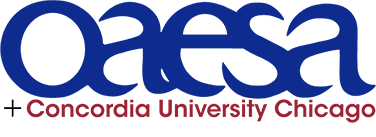Maggie Bender graduated from OAESA with Concordia University Chicago with an M.A. in School Leadership and currently works as a scholarship coordinator for an independent day school for students with learning differences in Ohio. As an educator that has served in several different positions, we asked Maggie to tell us about her time pursuing her master’s degree at OAESA with Concordia University Chicago.
Why did you want to work in education? What inspired you?
I actually started my undergraduate degree in nursing school and pursued that for two years. During that time, I worked as a preschool teacher and babysat for a few families. As I learned more about the medical field, I realized my passion for shaping children and helping them meet educational milestones was increasingly burning brighter and brighter. At that time, I decided to shift gears professionally and align my future career with my heart. In doing so, I went from being a struggling C student in my nursing program to a 4.0 student in my early childhood education courses.
Why did you choose OAESA with Concordia University Chicago (CUC) for your M.A. degree in school leadership?
There were several reasons why I chose OAESA with Concordia University Chicago for my second master’s program. At the time I was making my decision, I had a colleague who had just finished the program and shared how wonderful his experience had been which led me to research more. I knew I wanted to pursue a master’s degree in school leadership but hadn’t narrowed down the best option for me as a full-time educator. When looking at a variety of programs, many offered evening courses where I’d need to physically attend, online programs from different states that didn’t guarantee Ohio licensure at the completion of the program, or the requirement of being a full-time student which meant I’d have to leave my current job. Because OAESA partnered with Concordia University Chicago, I was able to be a full-time educator while having the flexibility of receiving an online degree without worrying if my license would be valid in the state of Ohio.
What skills did you gain or sharpen through your program at OAESA with Concordia University Chicago and how do you use them today?
The program allowed several opportunities for me to meet with my advisor from Concordia University Chicago as well as my supervisor(s) at my current school. Within the context of these meetings and through regular dialogue with them, I was able to enhance and build a stronger foundation of skills. Knowing their time is valuable and limited, I learned how to make clear proposals for projects and tasks. I was able to pre-plan meeting agendas to effectively communicate progress, questions, or concerns. Within these conversations, I was encouraged to lead in new ways which included presenting professional development to faculty and staff, heading committees, and analyzing student data. Additionally, I had exposure to several different styles of leadership as I sat in a variety of meetings. This offered perspective on how leadership styles can impact the direction and responses from a team. I continue to use and build upon these skills to prioritize and structure my time and meetings with colleagues.
How has your master’s degree impacted you in terms of your current position or a position you’d like to attain in the future?
Completing the school leadership program provided opportunities for leadership which consequently impacted my position for this school year. Through the exposure of organizing meetings, projects, and committees, my supervisors were able to observe skills that I previously did not have the opportunity to demonstrate. Because of this, I was promoted to oversee my department at the beginning of this school year!
Additionally, due to the nature of my job, I work with several local school districts. Many directors in the area knew that I was completing the program and have continued to share their interest in offering me a leadership position if one opens up in their school district.
What was a challenge you faced during your school leadership program, and who or what helped you overcome it?
By no fault of the program, the biggest challenge for me was navigating the difference between private and public educational settings. I work at a private school but all of the coursework in the program is geared toward public education. Because funding and curriculum look different in each setting, I was able to reach out to other directors in the community that work in public schools. Engaging in these conversations allowed me to partner and learn from other leaders in my community to increase my understanding of public education as well as build professional relationships that may not have occurred otherwise.
What was the biggest takeaway from your school leadership program?
A leader can make or break the success of a team. Having the opportunity to sit in a variety of meetings with different leaders from my school allowed me to observe and experience how leadership styles impact teams. I witnessed teams that were more fragile and timid when sharing their thoughts due to a micromanager; whereas, leaders that viewed themselves as collaborators cultivated creative, independent problem solvers. Although all schools, private or public, have their own unique strengths and challenges, I found that leaders who empower their teammates are vital to the success and growth of students’ educational careers across all academic settings.
What would you tell (or what advice would you give) prospective students considering the M.A. school leadership degree program at OAESA with Concordia University Chicago?
Though the idea of taking on additional responsibilities as a full-time educator while maintaining a healthy personal life certainly seems overwhelming, the program at OAESA with Concordia University Chicago makes this very attainable. The expectations and due dates for every course are consistent throughout the program. Once you learn the pattern of when discussion posts and papers are due, you will maintain that pace throughout the entirety of the program. Not only are the professors easily accessible, they provide scaled rubrics for every paper. This helped me plan, outline, and prepare successful papers that met the requirements of the course.
Because the program is geared toward full-time educators, the professors within the program know the demands of our daily work as educators and make your success in the program achievable. If you’re looking to further your career as an educator, I strongly encourage you pursue this!


